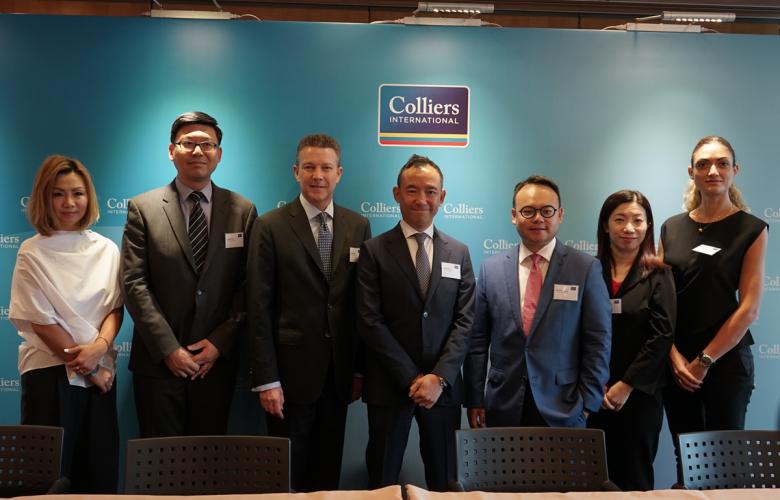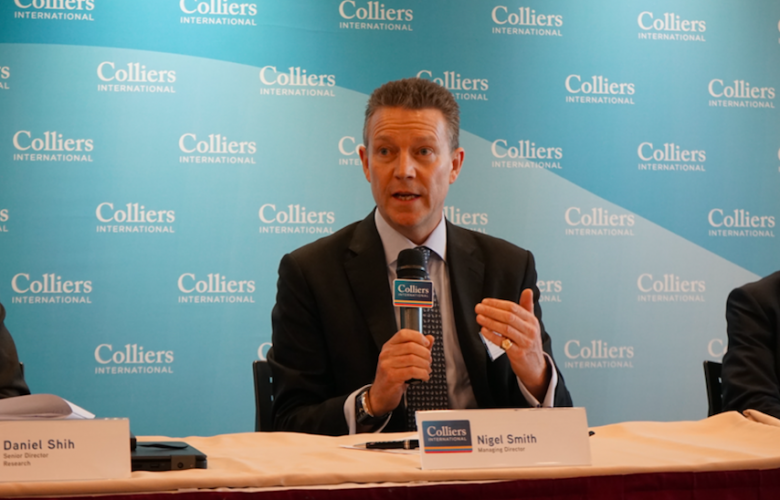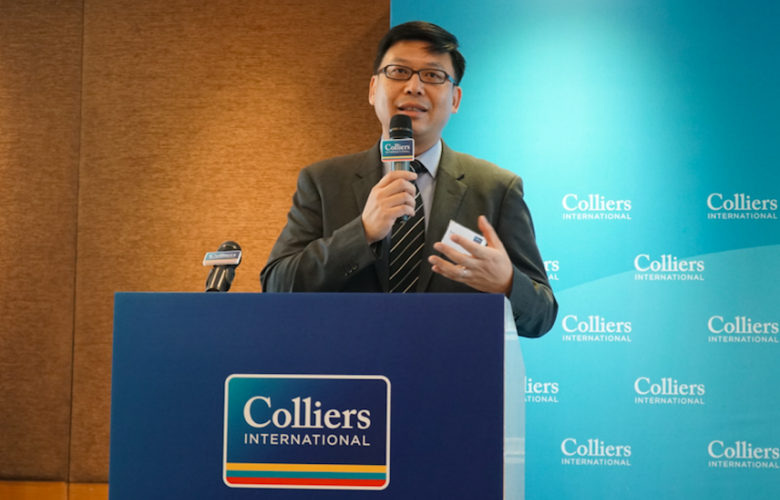Colliers International a global leader in commercial real estate services, held their mid-year press conference covering the latest trends and updates across Hong Kong’s property markets. From a positive and exciting first half of 2018 that witnessed favourable developments in investment, office, retail, and industrial; to a second half where Colliers remain cautiously optimistic as they foresee several factors that could have adverse effects.
At a glance:
- Hong Kong is the leading urban centre with the highest property transaction volumes in Asia.
- Across the city, co-working space operators have become major players, taking up 30% to 40% of new leasing spaces across Hong Kong Island and Kowloon.
- The retail market has observed the strongest recovery since the 2013-14 period.
- Large commitments by Goodman (Site cost: HKD 2.75 billion) and Cainiao (Investment: HKD 11.7 billion) indicate long-term confidence from international investors.
- Rising popularity in collective sales, driven by highly competitive public land sales, the acquisition of lands from private sectors by PRC developer groups, and increasing land prices have encouraged individual owners to participate in joint transactions.
“Hong Kong’s property markets have maintained a positive note throughout the first half of the year, a sentiment that will carry on in 2018 despite several adverse factors looming on the horizon. Overall, we see a very bright future for our city, particularly with respect to its position within the Greater Bay Area. Projects such as the Hong Kong Zhuhai Macau Bridge, the XRL and Lok Ma Chau Loop all serve as potent symbols of implementation of the Greater Bay Area master plan and Hong Kong’s opportunities for long-term growth.” – Nigel Smith, Managing Director of Colliers International Hong Kong.
Daniel Shih, Director of Research at Colliers International Hong Kong, told WILLIAMS MEDIA, "We believe the property sector will continue to achieve a strong full-year result. The supply shortage across all property sectors will be the most important factor to drive the price and rental values in Hong Kong. While the Government has been undertaking different study and prepared new policies to increase land supply, it is still years away from implementation. Hence, from our perspective, a moderate interest rate increase in H2 2018 is not going to have a major negative impact on the property market."
“Based on a positive first half of 2018, we foresee that Hong Kong will maintain a favourable momentum throughout the rest of the year. Hong Kong is now leading the region in terms of investment volumes, the office market is seeing a shake-up with co-working operators and decentralized districts garnering more attention, retailers are focusing on better digital experiences, and industrial is capitalizing on advances in technology,” he added.
Overall, the first half of 2018 has been an active property market with full-year GDP growth expected to reach 3.5% - 4%, this is followed by a positive sentiment supported by strong domestic consumption, an increase in tourism arrivals, and low unemployment rates.
Investment – Hong Kong leads the rest of Asia
Hong Kong is the leading urban centre with the highest property transaction volumes in Asia. However, rising economic tensions between the USA and major regional trading partners, increasing interest rates and tightening liquidity could affect Hong Kong and dampen the city’s investment sentiment for the rest of the year.
Office – Co-working, decentralized districts, and pre-leasing dominate
Across the city, co-working space operators have become major players, taking up 30% to 40% of new leasing spaces across Hong Kong Island and Kowloon. In Tsim Sha Tsui, the Express Rail Link (XLR), scheduled to start operations in Q3 2018, has made the district a popular office destination with mainland companies. Pre-leasing activities have become key for tenants in the market to secure future spaces – already 50% of new supply in 2019 has been committed and a lack of new supply heading into 2020 will drive up rents throughout 2019.
Retail – A greater focus on millennial audiences looking for new experiences
The retail market has observed the strongest recovery since the 2013-14 period. Now, retailers and shopping malls are adopting millennial-centric strategies that focus on experiential shopping and digital platforms; while international stylish apparel, affordable premium accessories, and demand for cosmetics and pharmaceutical goods are driving demand for more physical space. Landlords with properties on first tier streets in core shopping districts have witnessed strong demand, while second and third tier streets remain weak due to higher vacancies. Rents have only started to gradually pick up mid-year.
Industrial – Large commitments and technology advances paint a good picture
Large commitments by Goodman (GFA: 850,000 sqft, Site cost: HKD 2.75 billion) and Cainiao (GFA: 4,090,000 sqft, Investment: HKD 11.7 billion) indicate long-term confidence by international investors in Hong Kong’s strategic location. Rising rents and higher labour costs have resulted in the leasing market experiencing shorter lease cycles and an increasing use of 3PL to save costs. Hong Kong’s logistics sector has seen a greater emphasis on automation and robotic technologies in warehouse management to improve operational efficiencies.
Collective sales – Gaining popularity for purchasing and redeveloping properties
Hong Kong’s market has also seen a rising popularity in collective sales, which has been driven by highly competitive public land sales, the acquisition of lands from private sectors by groups of PRC developers, and increasing land prices that have encouraged individual owners to participate in joint transactions. The strong interest in collective sales is another indicator that the new housing policies might not be enough to tame the city’s robust property market.
H2 2018 – Colliers remains positive but cautious
Overall, Colliers will remain positive for 2018’s full-year growth prospects. However, for the second half of this year, Colliers anticipates the city’s price and rental growth to slow down due to several adverse factors on the horizon, including rising capital costs and increasing interest rates that could cap aggressive price increases. The tightening liquidity and continuous deleveraging in China would also reduce the number of transactions.
For more information or to discuss Hong Kong's H1 results and its outlook for the remainder of 2018, email Nigel Smith Managing Director of Colliers International Hong Kong, or Daniel Shih Head of Research for Colliers International Hong Kong, via the contact details listed below.
Source: Colliers International Hong Kong
Similar to this:
Attractive opportunities in China's investment property market - Colliers International
Rising U.S. hedging costs decrease Asian real estate investment
New real estate policies will streamline FDI in Myanmar - Colliers International











